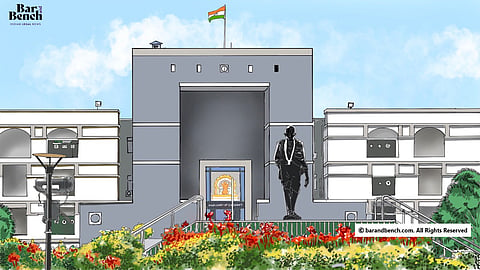
- News
- Columns
- Interviews
- Law Firms
- Apprentice Lawyer
- Legal Jobs
- हिंदी
- ಕನ್ನಡ

The Gujarat High Court has reiterated that a civil court lacks jurisdiction to entertain and decide questions about the citizenship of a person, and only the Central government is empowered to determine the same [Akil Valibhai Piplodwala v Central Government].
Justice Nisha M Thakore said that there was no doubt that the question of whether an individual has acquired another country’s citizenship or could be said to have renounced Indian citizenship on issuance of another country’s passport, can be decided only by the Central government.
“There is no iota of doubt that as per Sub-section (2) of Section 9 of the Citizenship Act, 1955, read with section 40 along with schedule III of the Citizenship Rules, 2009, the said question can exclusively be tried by the Central Government”, the order read.
The single-judge also noted that the question as to whether a civil court has jurisdiction to entertain a suit seeking declaration under the Indian Citizenship Act, had already been settled by the Supreme Court in State of UP v Shah Mohammad.
The Court was hearing an appeal against an order of the Principal District Judge.
The plaintiff had sought an order preventing his deportation till a decision regarding his citizenship was taken by the centre.
Alternatively, he had sought a direction to confer Indian citizenship on in terms of the Citizenship Act since he was married to an Indian citizen.
The trial court had directed the respondents to refrain from deporting the plaintiff while acknowledging that civil courts did not have the jurisdiction to decide on issues of citizenship however, reasoning that no one could be deprived of their life and liberty.
This order was quashed by the Principal District Judge. This decision was appealed by the plaintiff before the High Court.
The appellant submitted that the Principal District Judge failed to appreciate that he was born, brought up and received his primary education in India and evidence to support this was brought on record.
He also drew attention to the findings of the trial court that no material was placed on record by the respondents to show that he had voluntarily acquired the citizenship of another country.
The respondents, on the other hand, urged the Court to take note of the appellant’s conduct stating that he was guilty of suppressing material facts.
It was also highlighted that substantial proof had been brought on record to show that the appellant had been conferred Pakistani citizenship and was permitted to travel to India on a temporary residential permit.
The respondents contended that the burden of proof lay on the appellant to show that he was not a Pakistani citizen, and the judge had rightly found that he failed to dislodge the burden.
Attention was also drawn to an observation by a coordinate bench of the Court, in collateral proceedings, wherein it was recorded that the appellant was admittedly not an Indian citizen.
On examining the material, the Court said that since according to the District Judge and a coordinate bench the appellant was not an Indian citizen, he was excluded from civil jurisdiction to even look into infringement of his civil rights.
“The Court finds that any order rendering with issue falling under the domain of the Citizenship Act shall in no uncertain terms can be said to be usurpation of jurisdiction of authority under the Citizenship Act,” the High Court said,
Even otherwise, it was found that no substantial questions of law arise for consideration, the Court said.
Senior Advocate IH Syed and Advocate MR Molavi appeared for the appellant while the respondents were represented by Additional Solicitor General of India Devang Vyas.
[Read Judgment]